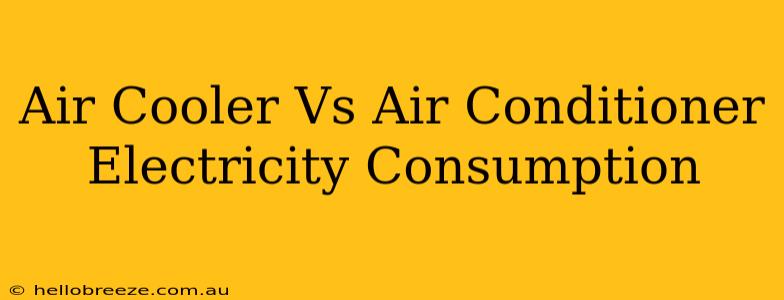Summer's heat can be brutal, leaving you searching for the best way to stay cool. Two popular choices emerge: air coolers and air conditioners. But which one is more energy-efficient? This article dives deep into the electricity consumption differences between air coolers and air conditioners to help you make an informed decision.
Understanding the Cooling Mechanisms
Before comparing electricity usage, let's understand how each appliance works.
Air Coolers: Evaporative Cooling
Air coolers, also known as evaporative coolers, work by evaporating water. A fan blows air over a wet pad or filter. As the water evaporates, it absorbs heat from the surrounding air, thus cooling it down. This is a natural process, making it relatively energy-efficient.
Air Conditioners: Refrigerant Cooling
Air conditioners utilize a refrigerant to cool the air. The refrigerant absorbs heat from indoor air and releases it outside. This process requires significantly more energy than evaporative cooling, making air conditioners generally less energy-efficient than air coolers, especially in dry climates.
Electricity Consumption Comparison: The Key Differences
The electricity consumption of air coolers and air conditioners varies considerably based on several factors including:
-
Climate: Air coolers are most effective in dry climates where evaporation is rapid. In humid climates, their cooling power diminishes significantly. Air conditioners, however, perform consistently regardless of humidity levels.
-
Size and Model: Larger units, whether air coolers or air conditioners, naturally consume more electricity. The specific model and its energy efficiency rating (EER or SEER) also play a crucial role. Look for high EER/SEER ratings for better energy performance.
-
Usage: Running an appliance constantly will naturally result in higher electricity consumption compared to intermittent usage.
Generally speaking:
-
Air coolers consume significantly less electricity than air conditioners. This is because the cooling process is less energy-intensive. You can expect to see a substantial difference in your energy bill.
-
Air conditioners, while consuming more power, offer superior cooling in humid climates and deliver a more consistent temperature. They are better at dehumidifying the air, which can be a significant benefit in damp environments.
Choosing the Right Appliance for Your Needs
The "best" choice depends on your specific needs and climate:
When to Choose an Air Cooler:
- Dry climate: Air coolers excel in dry areas where evaporation is efficient.
- Budget-conscious: Lower electricity consumption translates to lower energy bills.
- Environmentally conscious: Air coolers generally have a smaller carbon footprint.
- Large space cooling: Evaporative coolers can effectively cool large areas, especially with good airflow.
When to Choose an Air Conditioner:
- Humid climate: Air conditioners are more effective in humid environments where evaporative cooling is less efficient.
- Precise temperature control: Air conditioners offer precise temperature control and dehumidification.
- Superior cooling power: They offer a more powerful cooling effect.
- Noise levels: While advancements are being made, air conditioners tend to generate more noise than air coolers.
Energy Saving Tips for Both Appliances
Regardless of your choice, you can reduce electricity consumption with these tips:
- Regular Maintenance: Clean filters and coils regularly to maintain optimal efficiency.
- Proper Ventilation: Ensure adequate ventilation to maximize cooling performance and minimize energy waste.
- Smart Usage: Use timers or programmable settings to avoid unnecessary energy consumption.
- Energy-Efficient Models: Choose models with high EER or SEER ratings.
By understanding the differences in electricity consumption and choosing the right appliance for your specific needs, you can stay cool and comfortable while minimizing your environmental impact and keeping your energy bills manageable.

